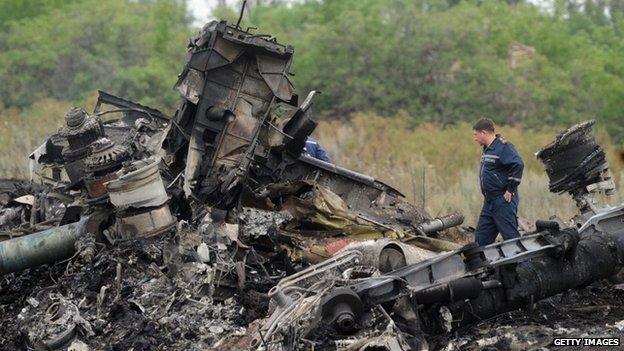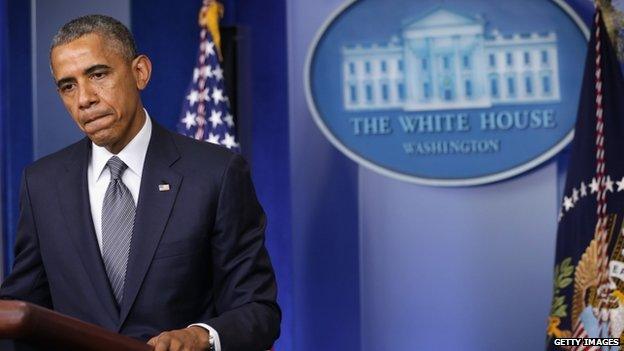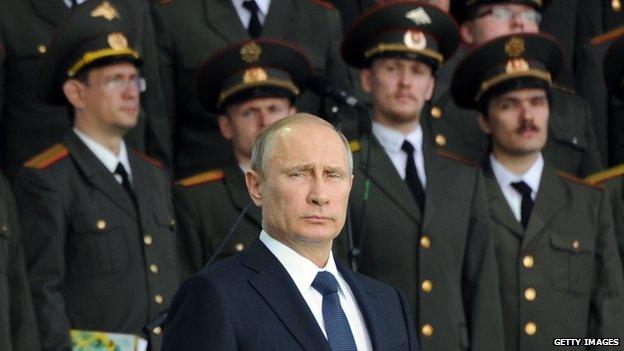PJ Crowley: Downed MH17 is tipping point in Ukraine
- Published

Malaysian Airlines flight 17 went down over Ukraine, killing 298 people onboard
Over the past nine months, many have looked at the Ukrainian conflict as a renewed clash of grand strategies - a new Cold War - with respective leaders deliberately moving pieces on the international chessboard.
But much like the old Cold War, a great deal of what happens is ad hoc, with proxies taking actions that can have unintended consequences and costs.
That appears to be the case with the downing of Malaysia Airlines Flight 17 in the skies over eastern Ukraine.
As US President Barack Obama indicated in a brief statement, it appears Ukrainian separatists fired a ground-to-air missile from territory they controlled.
In recent days, separatists have shot down multiple Ukrainian air assets. The most plausible explanation is they thought they were tracking a Ukrainian military aircraft, not a commercial airliner.
There is a fog of war. Commercial aircraft in conflict zones have been targeted by mistake before - Korean Air Flight 007 by Soviet forces in 1983 and Iranian Air Flight 655 by US forces in 1988.
If major powers cannot control everything that happens in proxy conflicts, they do control what they do in the aftermath of a tragedy like this.
It claimed the lives of 298 innocent civilians, most from the Netherlands, Malaysia and Australia.
How the key players react in the coming days and weeks will say a great deal about the future prospects for Ukraine and the nature of relations between Russia and the West.

US President Barack Obama has called for an international investigation into the crash
Obama labelled the crash a "global tragedy" and together with other leaders called for a thorough and credible international investigation.
Unlike the still-unsolved mystery of Malaysian Airlines Flight 370, the key questions of what happened with Malaysian Airlines Flight 17 should be answerable and relatively quickly.
There is an accident scene. The on-board flight data recorders have or will be recovered, although rumours they are already in Moscow is cause for concern.
There are eyewitnesses. Because it is a conflict zone, various nations already had significant amounts of intelligence capabilities trained on the area.
Among the key unknowns is who pulled the trigger, if anyone. Sophisticated air defence systems can fire automatically without human intervention.
Whoever was manning the system, how did they acquire it? The Buk missile was also in the Ukrainian arsenal at the start of the crisis.
Did Russia provide it, along with training or direct support? Or did separatists gain control by overrunning Ukrainian military positions?
Given the failure of the United States and international community to build public support for a decisive response last fall to Syria's use of chemical weapons - Syria has since given them up but intensified its use of conventional means to gain an advantage on the battlefield - they should be patient, let the investigation take its course and allow pressure to build on Putin to respond in more meaningful ways than he has to date.
Putin may not have total control over rebels in eastern Ukraine, but Russia's not-so-invisible hand extends deep into the country.

He should be able to lean on separatists to obey a ceasefire and enable an international investigation to advance.
Over the past 24 hours, Putin and Russia have supported calls for an investigation, both in public and in the United Nations Security Council.
But he has also blamed Kiev for creating the conditions that led to the tragedy.
What Putin does next should be viewed as his bottom line. A failure by Putin to acknowledge Russia's responsibility for what happened should have consequences.
If he clearly pulls back support, the tragedy can potentially create the opportunity for a negotiated settlement. If he doesn't, then Europe and the United States need to draw a sharper line with Russia, abandon their cautious and graduated approach of the past several months, impose more meaningful costs and restructure relations with Russia for the foreseeable future.
At the start of the Ukraine crisis, Europe and the United States suggested Russia's actions were inconsistent with 21st Century norms.
It is now time to redeem those words. Business as usual can no longer be the answer.
PJ Crowley is a former US assistant secretary of state and now a professor of practice and fellow at The George Washington University Institute of Public Diplomacy & Global Communication